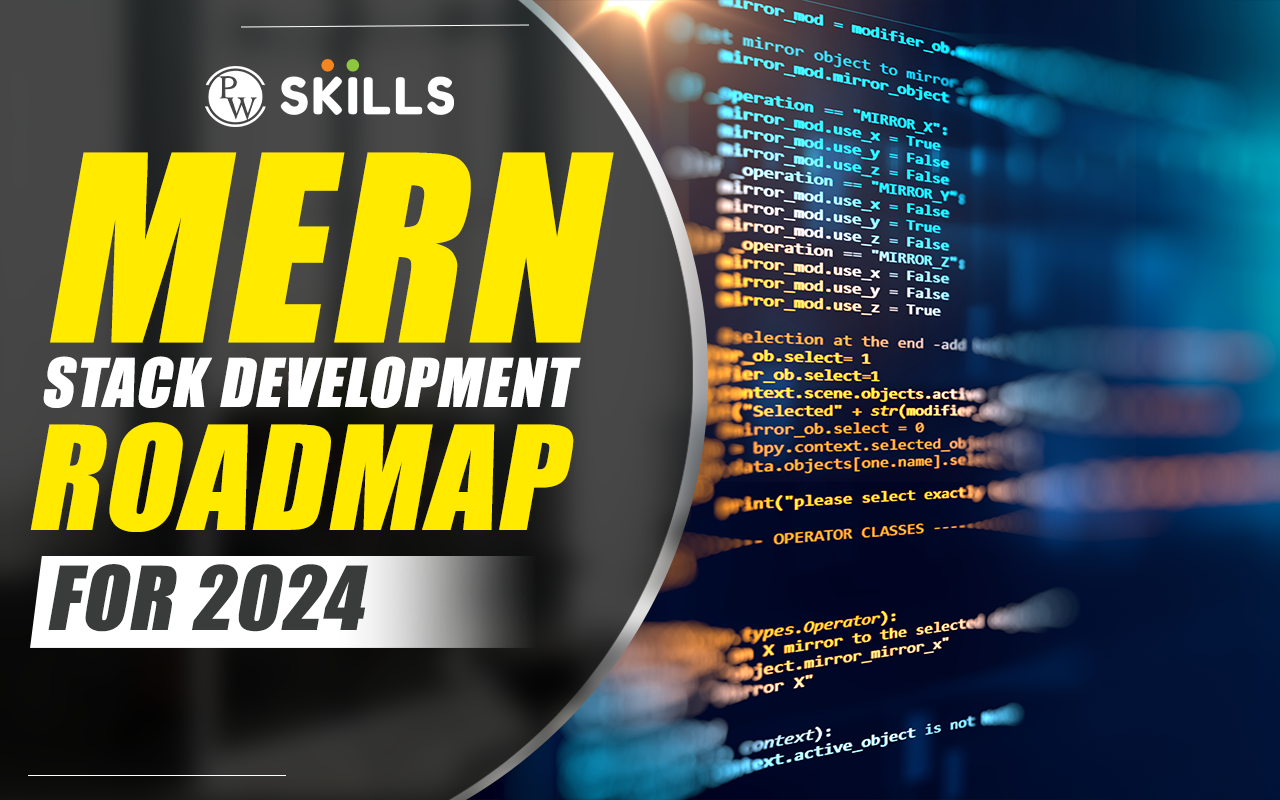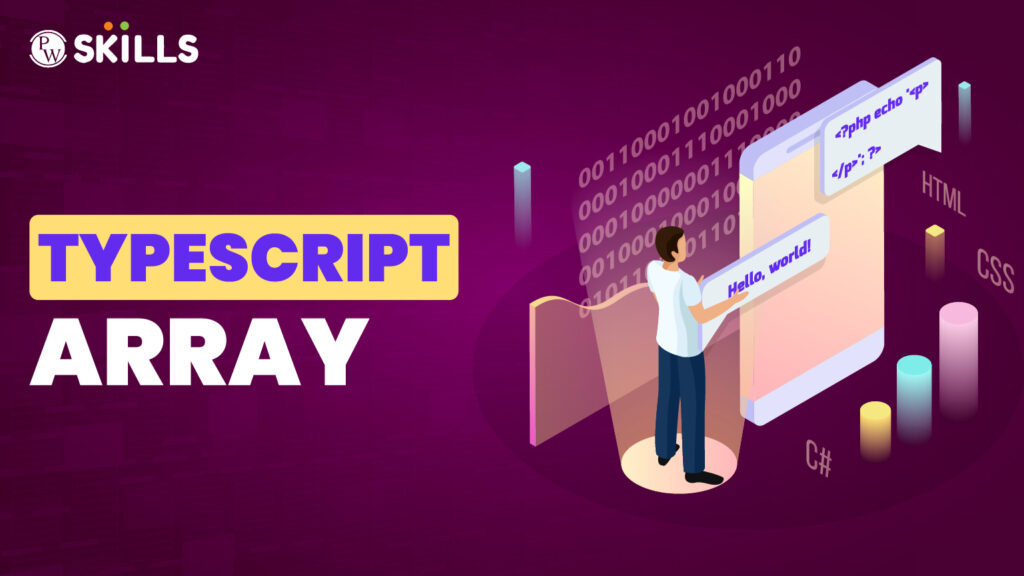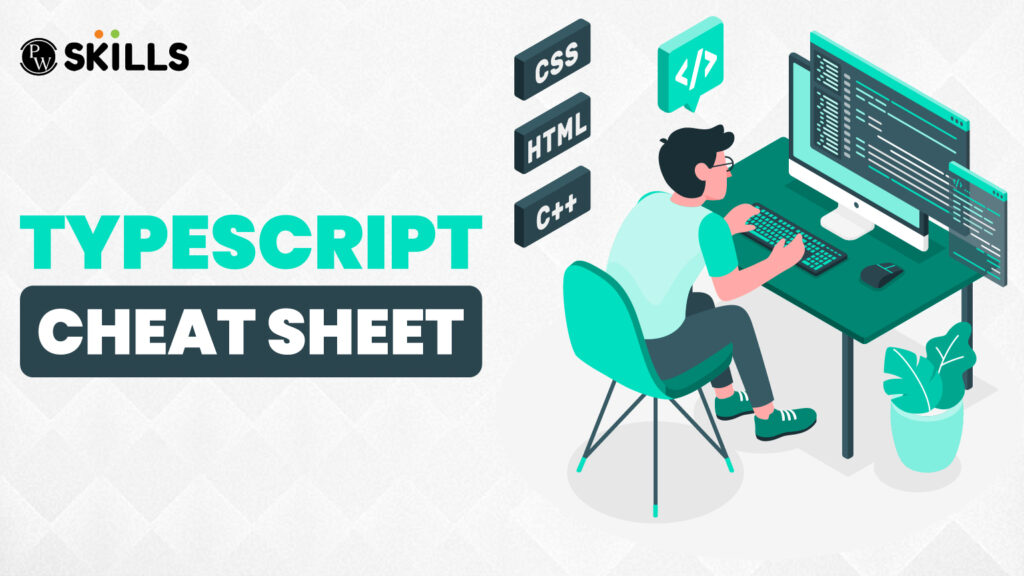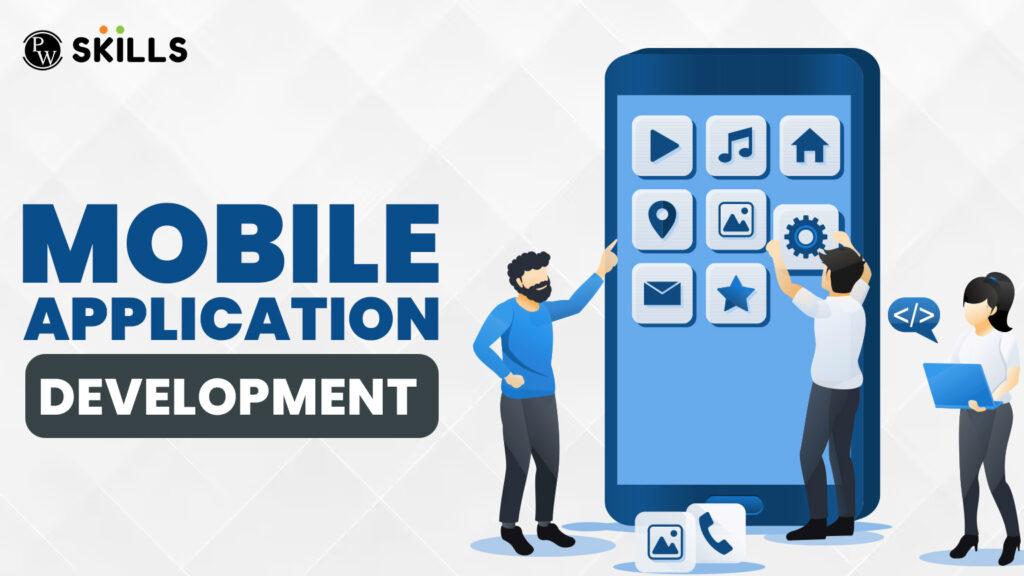With this in mind, it’s essential that developers remain aware of the best practices when creating powerful applications.
MERN stack development is one such option that offers a great way to build versatile and modern web apps. For anyone interested in learning more about this cutting-edge tech stack, here’s an overview of where it stands now – and what’s to come in 2024!
To give yourself the best chance of success, it is highly recommended to take advantage of a specialized course such MERN Full Stack Development by Physics Wallah. By enrolling in this course, you can use the “READER” coupon code to get discount, so hurry up and get ready for a robust future with MERN stack development. Remember: armed with knowledge and ambition, anything is possible!
MERN Stack Full Form
MERN Stack stands for MongoDB, Express.js, React, and Node.js.
Recommended Technical Course
- Full Stack Development Course
- Generative AI Course
- DSA C++ Course
- Data Analytics Course
- Python DSA Course
- DSA Java Course
MERN Stack Roadmap – How to Learn MERN Stack Development in 2024?
The MERN (MongoDB, Express.js, React, Node.js) Stack is a powerful combination of technologies for building robust web applications. A roadmap for mastering MERN Stack development involves progressing through various stages, acquiring skills in each component, and gaining hands-on experience. Here’s a comprehensive roadmap for MERN Stack development:
1) Foundational Knowledge:
- HTML, CSS, and JavaScript: Start with a strong foundation in front-end technologies.
- Basic Understanding of HTTP/HTTPS: Learn the fundamentals of web protocols.
2) Front-End Development:
- React.js: Deep dive into React.js, a JavaScript library for building user interfaces. Understand concepts like JSX, components, state, and props.
- React Router: Explore client-side routing to create single-page applications (SPAs).
- State Management: Learn about state management libraries such as Redux for managing application state.
3) Back-End Development:
- Node.js: Get hands-on with server-side development using Node.js. Understand asynchronous JavaScript and the event-driven architecture.
- Express.js: Learn how to build robust and scalable APIs with Express.js, a web application framework for Node.js.
- RESTful API Design: Understand REST principles for designing APIs.
4) Database Management:
- MongoDB: Master NoSQL database management with MongoDB. Learn about document-oriented databases and Mongoose, an ODM (Object Data Modeling) library for MongoDB and Node.js.
5) Full-Stack Application Development:
- Integration of Front-End and Back-End: Combine React.js with Node.js and Express.js to create a full-stack application. Implement CRUD operations to interact with the database.
6) Authentication and Authorization:
- JWT (JSON Web Tokens): Implement user authentication and authorization using JWT for secure communication between the client and server.
7) Deployment and Hosting:
- Heroku, Netlify, or Vercel: Learn how to deploy both front-end and back-end applications using cloud platforms.
8) Testing:
- Unit Testing: Explore testing frameworks like Jest for testing React components.
- API Testing: Use tools like Postman to test APIs.
9) Advanced Concepts:
- GraphQL: Understand and implement GraphQL for more efficient API queries.
- Server-Side Rendering (SSR): Explore technologies like Next.js for server-side rendering.
10) State-of-the-Art Practices:
- Microservices Architecture: Explore the concept of microservices for building scalable applications.
- Docker and Containerization: Learn about containerization with Docker for application deployment.
11) Continuous Integration/Continuous Deployment (CI/CD):
- CI/CD Pipelines: Implement CI/CD pipelines for automated testing and deployment.
12) Real-World Projects:
- Build Real-World Applications: Apply acquired skills by working on real-world projects. This could include e-commerce platforms, social media apps, or any other application that aligns with your interests.
13) Version Control:
- Git and GitHub: Master version control using Git and host your projects on GitHub.
14) Community Engagement:
- Join Developer Communities: Engage with the MERN Stack developer community, participate in forums, and contribute to open-source projects.
This roadmap provides a structured approach to mastering the MERN Stack, but it’s essential to customize it based on your pace, interests, and career goals. Regular practice, building projects, and staying curious are crucial for success on this learning journey.
Also read: Master the Art of Web Development with Decode Full Stack Web Dev 1.0
Roles and Responsibilities of a MERN Stack Developer
This table outlines various roles and their corresponding responsibilities for a MERN stack developer:
| Roles and Responsibilities of a MERN Stack Developer | |
| Role | Responsibilities |
| Full-Stack Developer | – Develop and maintain full-stack web applications using the MERN (MongoDB, Express.js, React, Node.js) stack.
– Collaborate with cross-functional teams to design, implement, and test features. – Ensure responsiveness and optimal performance of applications. |
| Front-End Developer (React.js) | – Implement user interfaces using React.js, ensuring high performance and responsive design.
– Collaborate with UX/UI designers to translate design wireframes into functional components. – Integrate front-end components with back-end services and APIs. |
| Back-End Developer (Node.js, Express.js) | – Design and implement server-side logic using Node.js and Express.js.
– Develop RESTful APIs for seamless communication between the front-end and database. – Implement data security and user authentication features. – Optimize server performance. |
| Database Developer (MongoDB) | – Design and manage MongoDB databases, ensuring efficient storage and retrieval of data.
– Implement data models, indexes, and queries for optimal database performance. – Troubleshoot database-related issues and ensure data integrity and security. |
| Full-Stack Testing and Debugging | – Conduct unit testing, integration testing, and end-to-end testing of applications.
– Identify and debug issues across the full stack, ensuring robust and error-free applications. – Collaborate with QA teams to address and resolve reported bugs and issues. |
| Code Optimization and Performance Tuning | – Optimize front-end and back-end code for performance, scalability, and maintainability.
– Identify and resolve bottlenecks, improving overall application speed and efficiency. – Stay updated on industry best practices for code optimization. |
Best MERN Stack Development Courses
While it’s likely that there will be many developments in MERN Stack Development over the next few years, it seems sensible to plan for what could happen in 2024. We’ve outlined the potential roadmap of tools and technologies that could influence the work of MERN Stack Developers in the near future, and hopefully, this has been helpful for you in formulating an up-to-date plan for your own career path.
It’s important to be informed and educated when it comes to choosing a tech stack, so would like suggest The MERN Full Stack Development Course by Physics Wallah. This course is well worth it if you’re looking forward to a long-term career in full stack development. So go ahead and take that first step towards success with the MERN stack syllabus!
Also read: Artificial Intelligence Course Syllabus 2024
How to Practice MERN Stack Development Skills?
Practicing MERN (MongoDB, Express, React, Node.js) stack development skills is crucial for mastering this technology stack. Here’s a guide on how to effectively practice MERN stack development:
1) Set Up Your Development Environment:
- Install Node.js and npm (Node Package Manager) to manage dependencies.
- Set up a code editor like Visual Studio Code for a seamless development experience.
- Install MongoDB for database operations.
2) Learn Each Component Individually:
- MongoDB: Understand MongoDB’s document-oriented data model, CRUD operations, indexing, and aggregation. Practice creating, updating, and querying documents.
- Express: Explore routing, middleware, and templating engines. Build RESTful APIs and understand how to handle HTTP requests and responses.
- React: Master the basics of React components, state, props, and JSX syntax. Learn about React Router for navigation and state management with tools like Redux.
- Node.js: Focus on server-side development. Learn how to create a server, handle HTTP requests, and integrate with databases.
3) Build Small Projects:
- Start with simple projects to reinforce your understanding of each component.
- Create a CRUD application with Express and MongoDB.
- Build a basic React application to practice front-end development.
4) Combine Components in Projects:
- Develop larger projects that integrate all MERN components.
- Implement user authentication, data validation, and error handling.
- Create a full-stack application with user registration, login, and data display features.
5) Use Version Control:
- Learn to use Git for version control. Practice creating branches, committing changes, and merging branches.
- Host your projects on platforms like GitHub to showcase your work.
6) Explore Third-Party Libraries and Tools:
- Familiarize yourself with popular libraries and tools in the MERN ecosystem.
- Use npm packages to enhance your projects. For example, use Mongoose for MongoDB interactions and Axios for making HTTP requests in React.
7) Follow Tutorials and Courses:
- Enroll in online courses like Physics Wallah or follow tutorials to gain structured learning.
- Participate in coding challenges and exercises to reinforce your skills.
8) Attend Meetups and Conferences:
- Join local or online developer communities and attend meetups.
- Participate in conferences or webinars to stay updated on MERN stack trends and best practices.
9) Build a Portfolio:
- Showcase your projects in a portfolio to demonstrate your skills to potential employers.
- Provide documentation for your projects, explaining the technologies used and the problems you solved.
Also read: Future of Data Science: Trends to Watch in 2025
For Latest Tech Related Information, Join Our Official Free Telegram Group : PW Skills Telegram Group
FAQs
Why is it important to follow a MERN Stack Roadmap?
Following a MERN Stack Roadmap is crucial for developers aiming to build expertise in full-stack web development. It offers a systematic approach, ensuring that developers acquire the necessary skills in a logical sequence, from basic concepts to advanced topics. This roadmap helps streamline the learning process, making it more efficient and comprehensive.
How long does it take to complete the MERN Stack Roadmap?
The duration to complete the MERN Stack Roadmap varies based on individual learning pace and prior experience. Beginners may take several months to a year to cover all aspects thoroughly. Continuous practice and hands-on projects can significantly expedite the learning process.
Are there any prerequisites for starting the MERN Stack Roadmap?
While there are no strict prerequisites, understanding HTML, CSS, and basic JavaScript is beneficial. Familiarity with web development concepts will help learners grasp MERN technologies more effectively.
How can one assess their progress on the MERN Stack Roadmap?
Developers can assess their progress by working on real-world projects, participating in coding challenges, and building portfolio pieces. Regularly revisiting and reinforcing learned concepts through coding exercises and projects is essential for mastery.
Is the MERN Stack Roadmap suitable for beginners?
Yes, the MERN Stack Roadmap is designed to cater to beginners. It provides a structured learning path, starting with foundational concepts and gradually progressing to advanced topics. Beginners are encouraged to practice consistently and seek support from online communities when facing challenges.






